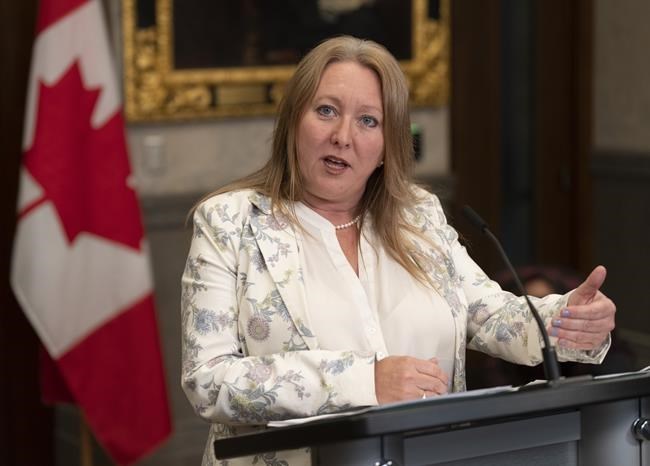OTTAWA — The federal minister responsible for the much-criticized access-to-information system says her focus is on improving service amid growing calls to go further and rewrite the transparency law.
Treasury Board President Mona Fortier said in an interview Friday her priority is better administration of the Access to Information Act, not a legislative overhaul.
A House of Commons committee released a report this week, in which opposition MPs recommended changes to the law to curb loopholes that prevent the release of information. They also said there should be penalties imposed when responses to requests are late.
The federal access law allows people who pay $5 to request an array of government documents, but many say it is slow and ineffective.
Government agencies are supposed to respond to requests within 30 days or provide valid reasons why more time is necessary.
The law has not been fully revamped since its introduction 40 years ago, and users complain of lengthy delays, heavily blacked-out documents or full denials in response to their applications.
Fortier said the government is emphasizing improvements to the online portal for making requests, enhanced recruitment and training of employees who handle applications and better guidance to federal agencies about the law.
"My current priority is really to improve the administration of the existing law and make it easier for Canadians, especially for employees to do the work, and for Canadians to access the information that they're seeking," she said.
"If we don't put the focus on the administrative process, we won't be able to make the next changes, I believe."
In her recent annual report, information commissioner Caroline Maynard said that since taking office five years ago she had "observed the steady decline of the access-to-information system to the point where it no longer serves its intended purpose.''
The commissioner, an ombudsperson for users of the law, said money to bolster the system has evaporated, commitments to transparency have vanished from ministerial mandate letters and it is clear that improving transparency is not a priority for the government.
Maynard noted that despite calls for meaningful change, a federal review concluded with a report last December that outlined no firm commitments and proposed no legislative reforms.
It was just one in a long line of studies and reviews.
In the Commons committee report this week, opposition MPs said the access law should be amended to limit time extensions for answering requests to a maximum of 60 days beyond the initial 30-day window, unless the information commissioner permits more time.
Among other changes, they also called for application of the access law to the office of the prime minister and his cabinet members, and to scale back exemptions in the law that currently limit the release of information concerning advice from officials and personal data.
The committee acknowledged that the Liberal government made changes to the access regime in 2019 that increased the information commissioner's powers, waived fees beyond the $5 application charge and introduced regular disclosure of routine material such as titles of government briefing notes.
But the opposition members also noted the 2019 legislation "was criticized by several witnesses for not really effecting the desired change."
Fortier said she appreciates the committee's recommendations, adding "we'll be looking into them, of course, over the summer and in the fall and be able to comment on them after reviewing them closely."
Fortier also pointed out that Liberal MPs on the committee issued a dissenting opinion. It highlighted the federal intention to improve service delivery, enhance staff levels, meet the needs of Indigenous users of the law more effectively, and develop measures such as declassification of historical records.
The minister reiterated her intention to release a plan with next steps for the access regime before the end of the calendar year.
The government should stop delaying and introduce a bill to close the secrecy loopholes in the law, strengthen enforcement and establish penalties, as the committee and most interested parties have recommended, said Duff Conacher, co-founder of public-interest group Democracy Watch.
He said the Liberal MPs "stick to the party line" that the changes the government made four years ago are enough to solve the problem of excessive secrecy, "even though everyone else is saying many other key changes are needed to ensure government transparency and the public's right to know."
Conacher said if the government doesn't introduce a bill to reform the access law in the fall, the opposition parties should band together to support legislation to make key changes.
This report by The Canadian Press was first published June 23, 2023.
Jim Bronskill, The Canadian Press



